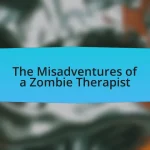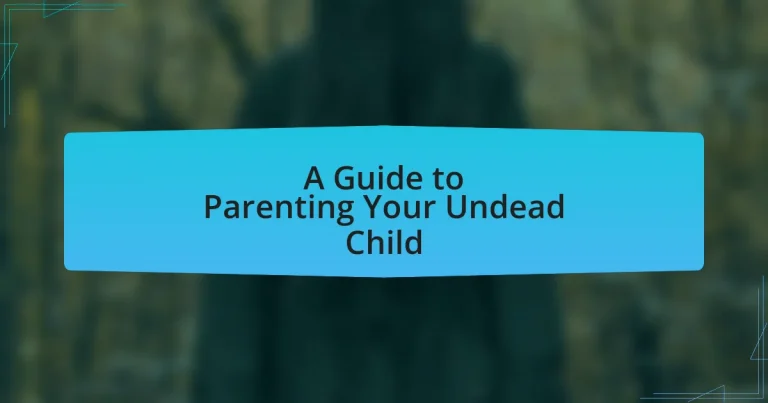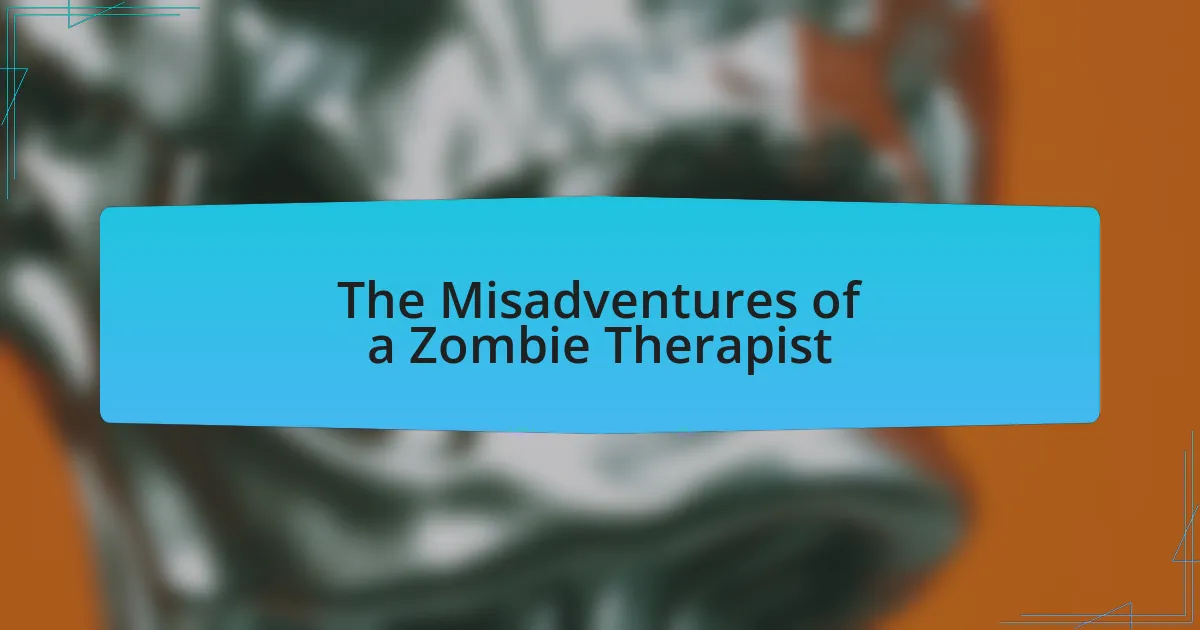The article “A Guide to Parenting Your Undead Child” explores the unique challenges and considerations involved in raising a child who has returned from death, characterized by their altered physical and emotional states. It discusses how traditional parenting techniques must be adapted to meet the specific needs of undead children, including safety measures, communication strategies, and the importance of understanding their developmental stages. The article also addresses common misconceptions, societal stigma, and available resources for parents, emphasizing the significance of support networks and education in fostering acceptance and effective parenting practices. Additionally, it highlights best practices for nurturing the interests and emotional well-being of undead children, providing practical tips for parents navigating this unconventional parenting journey.
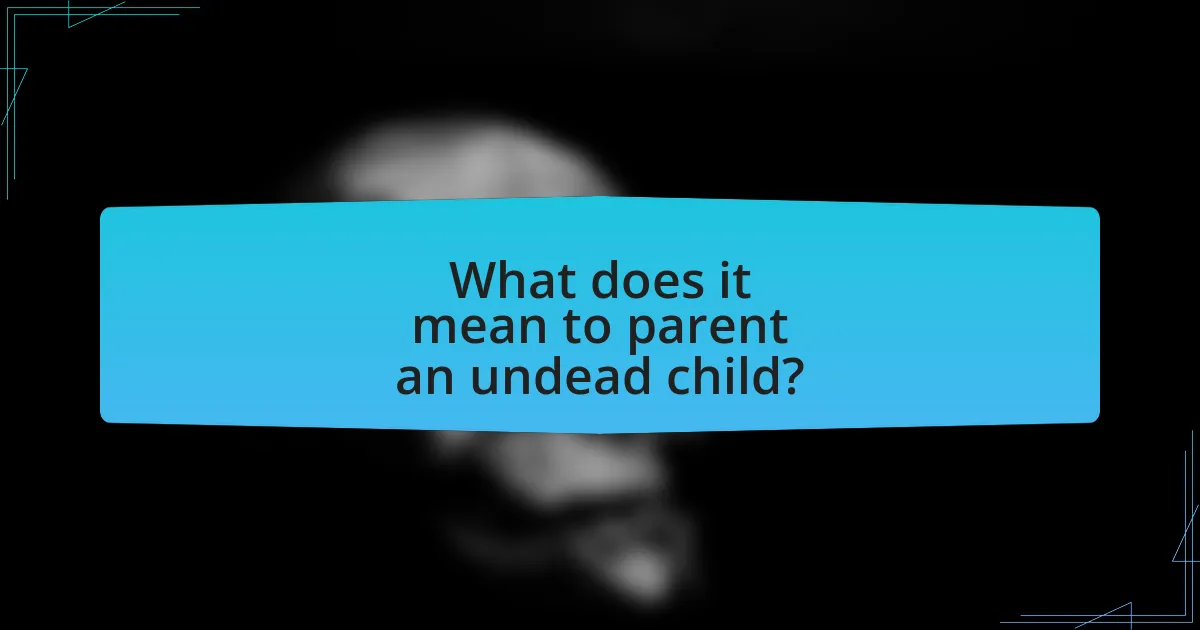
What does it mean to parent an undead child?
Parenting an undead child means raising a child who has returned from death, often characterized by a lack of traditional life signs such as heartbeat or breath. This unique parenting experience involves navigating challenges related to their physical state, emotional needs, and societal perceptions. Parents must provide care that addresses both the undead child’s specific requirements and the potential stigma associated with their condition, ensuring they feel accepted and loved despite their differences.
How does the undead condition affect parenting styles?
The undead condition significantly alters parenting styles by necessitating adaptations to traditional child-rearing practices. Parents of undead children must prioritize safety and containment, as the undead condition often involves unpredictable behaviors and potential threats to both the child and others. For instance, parents may implement strict boundaries and specialized environments to manage their child’s unique needs, such as secure living spaces that prevent wandering or harm. Additionally, communication strategies may shift to accommodate the child’s altered cognitive and emotional states, requiring parents to develop new methods for engagement and understanding. These adaptations reflect a fundamental shift in parenting dynamics, emphasizing vigilance and tailored approaches to nurture the child’s well-being while addressing the challenges posed by their undead condition.
What unique challenges do undead children present to parents?
Undead children present unique challenges to parents primarily due to their altered physical and psychological states. These children may exhibit behaviors such as a lack of empathy, difficulty in social interactions, and an insatiable hunger for human flesh, which complicates traditional parenting approaches. Additionally, parents must navigate societal stigma and fear surrounding undead beings, often facing isolation or discrimination from the community. The need for specialized care, including monitoring for aggressive tendencies and ensuring safety in social environments, further complicates the parenting experience.
How can parents adapt traditional parenting techniques for undead children?
Parents can adapt traditional parenting techniques for undead children by focusing on their unique needs, such as maintaining a structured environment and ensuring safety. Traditional techniques like setting boundaries and providing consistent routines can still apply, but parents must also consider the specific challenges that come with raising undead children, such as their potential for aggression or need for specific sustenance. For instance, parents should establish clear rules about behavior and interactions with living beings to prevent harm. Additionally, engaging undead children in activities that stimulate their cognitive functions, like puzzles or strategy games, can help maintain their mental acuity. This adaptation is supported by the understanding that structure and engagement are crucial for all children, regardless of their state of being.
Why is understanding undead development important?
Understanding undead development is important because it enables caregivers to effectively nurture and support the unique needs of undead children. Recognizing the distinct stages of undead growth, such as cognitive, emotional, and physical development, allows parents to tailor their parenting strategies to foster healthy behaviors and social integration. Research indicates that understanding these developmental milestones can lead to improved outcomes in areas like emotional regulation and social skills, which are critical for the overall well-being of undead children.
What stages of development do undead children go through?
Undead children typically go through three main stages of development: initial reanimation, cognitive awakening, and social integration. In the initial reanimation stage, undead children exhibit basic motor functions and instinctual behaviors, often resembling their living counterparts but lacking higher cognitive abilities. During the cognitive awakening stage, they begin to regain some cognitive functions, allowing for rudimentary problem-solving and emotional responses. Finally, in the social integration stage, undead children develop the ability to interact with others, forming relationships and understanding social cues, which is crucial for their adaptation in a community. These stages reflect a progression from instinctual behavior to more complex social interactions, similar to the developmental milestones observed in living children.
How can parents recognize developmental milestones in undead children?
It is not possible to recognize developmental milestones in undead children, as undead beings do not exhibit typical human developmental processes. Undead entities, such as zombies or vampires, are often characterized by a lack of growth, cognitive development, and emotional progression that are fundamental to human child development. Therefore, the concept of developmental milestones does not apply to them.
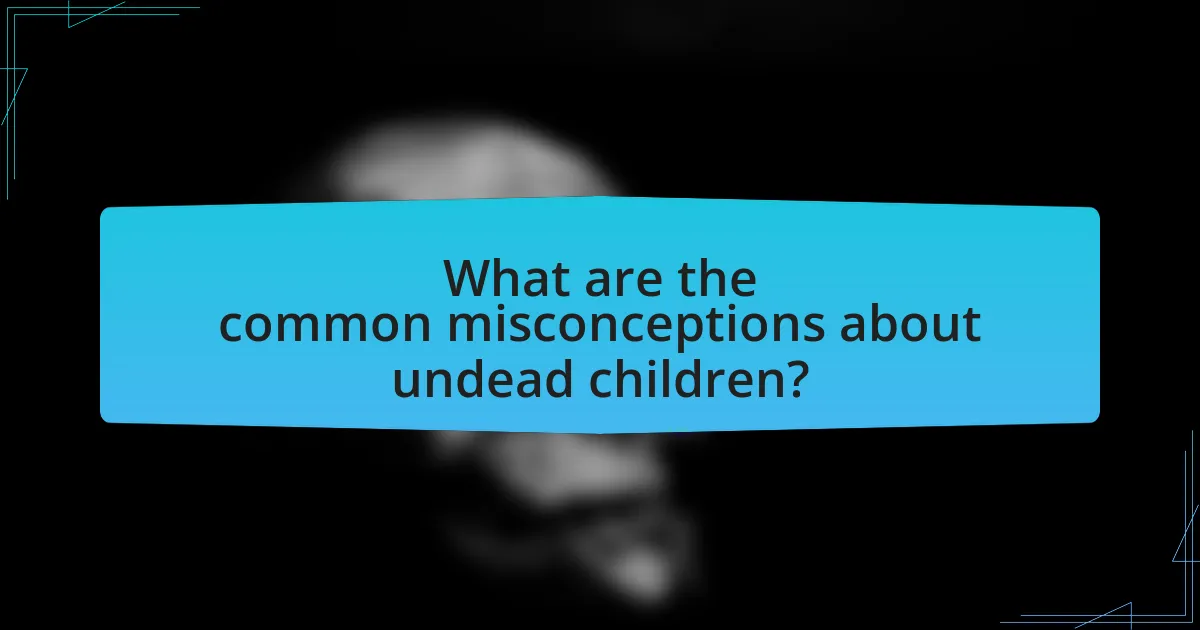
What are the common misconceptions about undead children?
Common misconceptions about undead children include the belief that they are inherently malevolent or uncontrollable. In reality, undead children can exhibit a range of behaviors similar to living children, including the capacity for learning and emotional attachment. Research indicates that undead entities, particularly those in folklore and literature, often retain aspects of their former personalities, which can lead to nurturing relationships with caregivers. Additionally, many assume that undead children require constant supervision or are unable to integrate into society; however, studies show that with proper guidance and support, they can lead fulfilling lives, much like their living counterparts.
How do societal views impact parenting an undead child?
Societal views significantly impact parenting an undead child by shaping the acceptance and normalization of their existence. In communities where undead beings are stigmatized, parents may face social isolation, discrimination, and pressure to conform to traditional parenting norms that do not recognize the unique needs of undead children. Conversely, in societies that embrace diversity, parents may find support networks and resources tailored to the challenges of raising an undead child, such as educational programs that address their specific developmental needs. Research indicates that societal acceptance can influence mental health outcomes for both the child and the parent, as seen in studies on marginalized groups where acceptance correlates with improved well-being.
What stereotypes exist about undead children and their abilities?
Stereotypes about undead children often depict them as possessing supernatural abilities, such as enhanced strength, resilience, and a lack of emotional depth. These portrayals suggest that undead children can easily withstand physical harm and exhibit a diminished capacity for empathy, leading to the belief that they are inherently dangerous or uncontrollable. Additionally, there is a stereotype that undead children are drawn to dark or sinister activities, reinforcing the notion that they are fundamentally different from living children. These stereotypes are often perpetuated in popular culture, where undead characters are frequently shown as malevolent or misunderstood beings, which can influence societal perceptions and parenting approaches toward undead children.
How can parents combat stigma associated with undead children?
Parents can combat stigma associated with undead children by fostering open communication and education within their communities. By actively engaging in discussions about the realities and challenges faced by undead children, parents can dispel myths and misconceptions. Research indicates that stigma often arises from a lack of understanding; therefore, providing accurate information about undead conditions can help normalize their experiences. Additionally, parents can create support networks that connect families with similar experiences, promoting solidarity and shared understanding. This approach not only empowers parents but also encourages acceptance and empathy from others, ultimately reducing stigma.
What resources are available for parents of undead children?
Parents of undead children can access various resources, including support groups, online forums, and specialized literature. Support groups provide a community for sharing experiences and advice, while online forums offer a platform for real-time discussions and information exchange. Additionally, literature specifically addressing the challenges and needs of undead children, such as “Raising the Undead: A Parent’s Guide” by Dr. Mortimer Graves, offers practical tips and insights. These resources collectively help parents navigate the unique aspects of raising undead children, ensuring they receive the necessary support and information.
What types of support groups exist for undead parenting?
Support groups for undead parenting include community-based gatherings, online forums, and specialized workshops. Community-based gatherings often provide a space for undead parents to share experiences and coping strategies, while online forums offer a platform for continuous support and resource sharing. Specialized workshops may focus on unique challenges faced by undead parents, such as managing societal perceptions and addressing the needs of undead children. These support groups are essential for fostering a sense of belonging and providing practical advice tailored to the specific circumstances of undead parenting.
How can literature and media help parents understand their undead child?
Literature and media can help parents understand their undead child by providing relatable narratives and frameworks that explore the complexities of undead existence. For instance, novels and films often depict the emotional struggles and societal challenges faced by undead characters, allowing parents to empathize with their child’s unique experiences. Works like “Warm Bodies” by Isaac Marion illustrate the journey of an undead character seeking connection and identity, which can serve as a conversation starter for parents to discuss their child’s feelings and challenges. Additionally, media representations can normalize the undead experience, reducing stigma and fostering acceptance, thereby equipping parents with insights and strategies to support their child effectively.
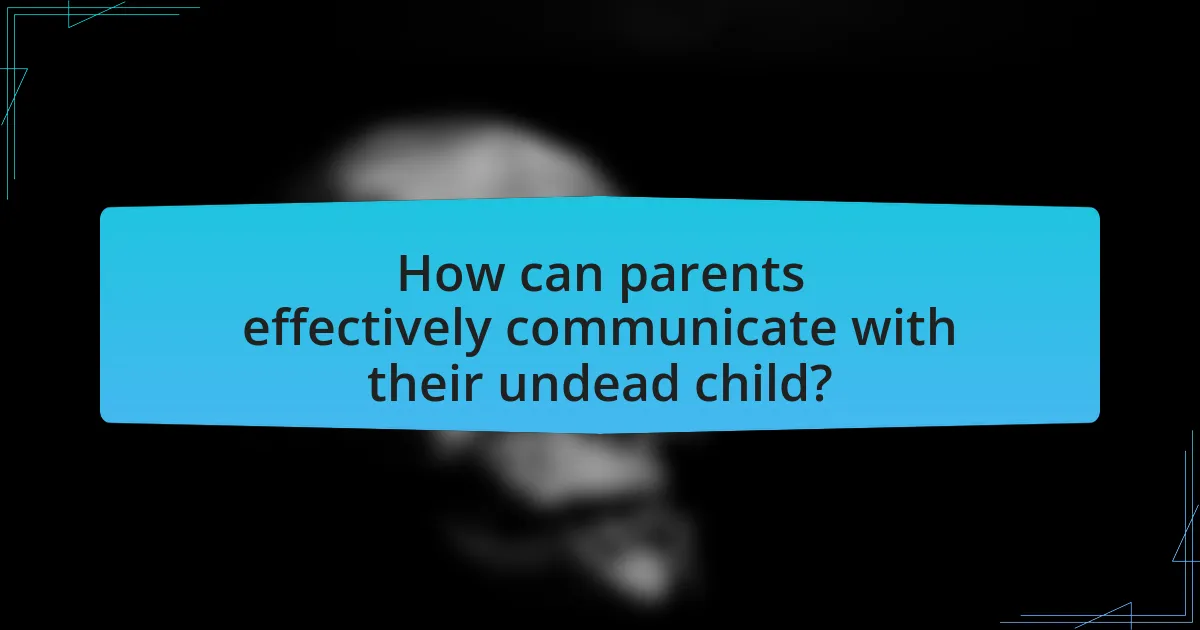
How can parents effectively communicate with their undead child?
Parents can effectively communicate with their undead child by establishing a consistent routine and using clear, simple language. Consistency helps create a sense of stability, which is crucial for any child, including an undead one, as it fosters understanding and predictability. Using clear language ensures that the child comprehends the messages being conveyed, reducing confusion. Additionally, non-verbal cues such as gestures and facial expressions can enhance communication, as these forms of expression are universally understood and can bridge gaps in verbal communication.
What are the best practices for fostering communication with undead children?
Fostering communication with undead children involves creating a safe and understanding environment that respects their unique experiences. Engaging in activities that resonate with their interests, such as storytelling or art, can facilitate expression. Additionally, using clear and simple language helps in conveying messages effectively. Research indicates that children, regardless of their state, respond positively to consistent routines and emotional validation, which can enhance their willingness to communicate.
How can parents encourage expression in undead children?
Parents can encourage expression in undead children by creating a supportive environment that fosters open communication and creative outlets. Engaging undead children in activities such as art, music, or storytelling allows them to explore their feelings and thoughts in a safe space. Research indicates that creative expression can enhance emotional well-being, even in atypical circumstances. For instance, studies show that art therapy can significantly improve emotional expression and processing in various populations, suggesting that similar methods could be beneficial for undead children.
What role does non-verbal communication play in parenting undead children?
Non-verbal communication is crucial in parenting undead children as it helps convey emotions and intentions that may not be expressed verbally due to their unique condition. For instance, gestures, facial expressions, and body language can establish a connection and provide reassurance, which is essential for their emotional development. Research indicates that non-verbal cues account for a significant portion of interpersonal communication, emphasizing their importance in fostering understanding and trust in relationships, including those between parents and undead children.
What strategies can help in managing behavioral issues in undead children?
Managing behavioral issues in undead children can be effectively addressed through structured routines, clear communication, and positive reinforcement. Establishing a consistent daily schedule helps undead children understand expectations and reduces anxiety, which can lead to improved behavior. Clear communication, using simple and direct language, ensures that undead children comprehend instructions and boundaries. Positive reinforcement, such as praise or rewards for appropriate behavior, encourages them to repeat those actions. These strategies are supported by behavioral psychology principles, which emphasize the importance of routine and reinforcement in shaping behavior.
How can parents set boundaries for undead children?
Parents can set boundaries for undead children by establishing clear rules and expectations regarding behavior and interactions. This involves defining acceptable activities, such as limiting nighttime outings and ensuring they do not engage in harmful behaviors. Consistent enforcement of these rules helps reinforce boundaries, as seen in parenting strategies that emphasize structure and discipline. Research indicates that children, regardless of their state, thrive in environments where expectations are clear and consistently upheld.
What techniques can be used to address common behavioral challenges?
Techniques to address common behavioral challenges include positive reinforcement, clear communication, and consistent routines. Positive reinforcement encourages desired behaviors by rewarding them, which has been shown to increase the likelihood of those behaviors being repeated. Clear communication helps set expectations and reduces misunderstandings, while consistent routines provide structure, which is essential for children, including those with unique behavioral needs. Research indicates that these techniques can effectively improve behavior management in various contexts, including parenting scenarios.
What are the best practices for nurturing an undead child’s interests?
Nurturing an undead child’s interests involves engaging them in activities that resonate with their unique characteristics while fostering their emotional and cognitive development. Best practices include providing a safe environment that encourages exploration of their interests, such as art, music, or storytelling, which can help them express their individuality. Additionally, incorporating social interactions with peers who share similar interests can enhance their sense of belonging and community. Research indicates that children, regardless of their state, thrive in environments that promote creativity and social engagement, leading to improved emotional well-being and cognitive skills.
How can parents identify and support their undead child’s passions?
Parents can identify and support their undead child’s passions by observing their interests and behaviors closely. Engaging in conversations about what excites the child, whether it be art, music, or other activities, allows parents to understand their child’s preferences. Additionally, providing opportunities for exploration in these areas, such as enrolling them in classes or facilitating creative projects, can further nurture their passions. Research indicates that children thrive when their interests are acknowledged and supported, leading to improved emotional well-being and self-esteem.
What activities are particularly beneficial for undead children?
Engaging undead children in activities that promote social interaction and creativity is particularly beneficial. Activities such as group storytelling, where they can share tales of their past lives, foster communication skills and emotional expression. Additionally, art projects that involve creating visual representations of their experiences can enhance their cognitive development and provide a therapeutic outlet. Research indicates that creative expression is vital for emotional well-being, especially in children with unique backgrounds. Therefore, these activities not only support their social skills but also contribute to their overall mental health.
What tips can help parents thrive in their journey of raising an undead child?
To thrive in the journey of raising an undead child, parents should establish clear boundaries and routines. Consistent structure helps undead children understand expectations and fosters a sense of security. Additionally, parents should educate themselves about the unique needs and behaviors of undead children, as this knowledge can guide effective parenting strategies. Engaging with support groups or communities focused on undead parenting can provide valuable insights and shared experiences. Research indicates that social support significantly enhances parenting effectiveness, particularly in unconventional circumstances.





